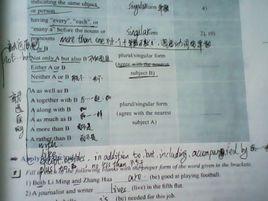基本簡介
as well as;(together/along/combined)with;rather than;except;besides;but;including;in addition to;apart from, like, as much as, no less than,
例句
Nobody but two students is in the classroom.除了這兩個學生,沒有人在教室
Everybody except you is down on me. 除了你,大家都看不起我。
A woman with two children has come. 一位婦女帶著兩個孩子已經來了。
John, rather than his roommates, is to blame. 約翰,而不是他的室友,應該受到責備。
Jim, together with his classmates, has seen the film. 吉姆和他的同學一起看了這部電影。
My father, no less than I, is a base-ball fan. 我的父親不亞於我也是個棒球迷。
The son, as well as his parents, wants to go there. 不但兒子想去那兒,而且他的父母也想去。
The teacher, as well as the students, is interested in the activity. 老師也和同學們一樣對這項活動有興趣。
具體分類
一。由 or,not only … but also …, either … or …, neither … nor …,not … but …等連線兩個名詞作主語時,謂語動詞的單複數形式要根據就近原則來確定。
如:
You or he is going to be sent to study abroad .
He or we are going to be sent to study abroad .
二、“名詞 + 介詞 /介詞短語( with,together with,along with,as well as 等) + 名詞”作主語時,謂語動詞的單複數由介詞前的名詞的單複數形式決定。
如:
Tom as well as his parents enjoys fishing .
You as well as your brother have been accepted .
三、主語從句、不定式或動名詞作主語時,謂語動詞要用單數形式。
如:
What we can’t get seems better than what we have .
Taking more exercise is good for your health .
四、定語從句中,當先行詞在從句中作主語時,從句謂語與先行詞的人稱和數保持一致;但“ one of +名詞複數”作先行詞時,如在 one 前有 the,the very,the only 等詞修飾時,從句謂語動詞要用單數形式,若沒有,則用複數形式。
如:
He is one of the students who have been praised by the headmaster .
He is the only one of the students who has been praised by the headmaster .
五、there be 句型中,be 的單複數形式由其後的名詞決定,如果有兩個或兩個以上的名詞,則按就近原則決定。
如:
There is only a desk in the room .
There is only a desk and two chairs in the room .
There are two chairs and a desk in the room .
十、“ the + 形容詞”作主語表示一類人時,謂語動詞一般用複數形式。
如:
The rich don’t understand the life of the poor .

